We’re reader-supported. When you buy through links on our site, we may earn an affiliate commission.
5.2 million websites use Shopify. 1
So, ClickFunnels is the underdog in this comparison. It’s up and coming for good reasons.
I’ll help you decide between ClickFunnels or Shopify. But do know that you can use both at the same time! Yes, there’s an app for that! I’ll tell you about it in a moment.
ClickFunnels vs Shopify is quite the battle.
Billionaire Kylie Jenner uses Shopify. And ClickFunnels has grown to a 100 million dollar company in just a few years.
Let’s explore. But first, I found this story from Hannah Perry about how she’s growing her cotton candy business on Shopify to be really inspiring:
Table of Contents
ClickFunnels vs Shopify Overview
About 14.9% of all retail sales happen online.2 So there’s big money to be made.
If you’re trying to decide whether to use ClickFunnels or Shopify, you need to understand they’re completely different platforms.
Both can help you create a website for your business – but they prioritize different things.
Want a sales funnel that guides people through your website and encourages them to buy specific products? Then, ClickFunnels is your Shopify vs ClickFunnels winner.
Trying to sell a catalog of products through a stylish online store? Then, Shopify is the obvious choice.
What’s great is you don’t have to choose ClickFunnels or Shopify. You can use both!
Extra Point: If you love the power of ClickFunnels for your advertising but also want the benefits of Shopify, you can use the ClickifyPro app to connect them.
Now that you’ve got a basic idea of the ClickFunnels vs Shopify debate, let’s break out the magnifying glass and examine each platform up close.
What Is ClickFunnels and How Does ClickFunnels Work?
ClickFunnels is a website builder that helps you create web pages according to the sales funnel philosophy.
You’ll build a website that sends visitors down a funnel of web pages. At the bottom of that funnel, they’ll end up buying your products or signing up for your services.
Kenneth Fong gives a helpful Clickfunnels overview:
Creating funnels is easy. Once you’ve signed up for ClickFunnels, follow these steps:
- Choose from the dozens of available funnel templates.
- Drag and drop specific elements onto each web page.
- Add text and images that correspond to your business.
When you’re done, you’ll have a series of web pages that send people right where you want them: the page where they’ll confirm their purchase or registration.
While the funnels are definitely the best part of ClickFunnels (they put “funnels” in the name for a reason), the company offers a whole lot more. You can use ClickFunnels to create a well-rounded website.
Look at these ClickFunnels features:
- Sales funnels
- Blogs
- Membership sites
- Online courses
- Email marketing tools
- Analytics and A/B testing
- Store funnels
I bolded “store funnels” because it’s especially relevant to the ClickFunnels vs Shopify discussion.
Remember, Shopify’s claim to fame is that they create amazing online stores. Well, ClickFunnels can do that, too!
ClickFunnels helps you display your products and send your customers through a seamless checkout process.
Let me be clear: If you’re choosing to use either ClickFunnels or Shopify and your main priority is a killer online store, Shopify is still the obvious choice.
But let’s say you’re digging the sales funnel idea that ClickFunnels offers. You could go for ClickFunnels and still get the online store you wanted.
So, really, the winner of the Shopify vs ClickFunnels depends on your priorities.
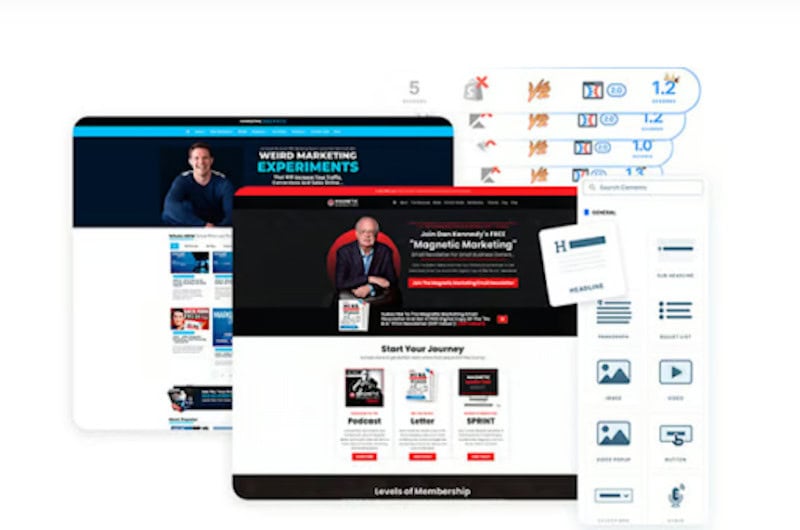
What Is Shopify and How Does Shopify Work?
Shopify is a platform that helps you create an online store. Want to sell a variety of products through your own “mini Amazon?” Shopify can help.

Creating a Shopify store is a top business ideas for women or really anyone who wants to focus on products, marketing, and customer service while Shopify does the rest, like payment processing, technology, and more.
Shopify walks you through every part of the business process. Here are the steps:
- Business creation. You’ll build and customize your online store.
- Selling. Shopify gives you the tools you need to set up a seamless sales process for both online checkout and in-person sales.
- Marketing. You’ll get tools for finding new customers online and through social media.
- Business management. From high-end analytics to inventory and shipping solutions, Shopify gives you what you need to run your online store.
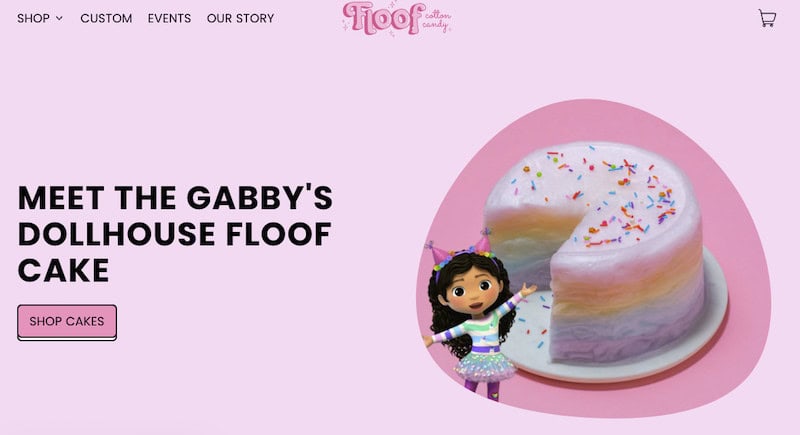
I want to highlight the business management side of Shopify, since that’s what really sets Shopify apart in the ClickFunnels vs Shopify debate. (ClickFunnels offers these features too, but Shopify has been doing it for nearly 20 years.)
Shopify offers next-level solutions for anyone in the online retail business, including:
- Inventory management
- Shipping with discounted rates from UPS, USPS, and DHL
- Order fulfillment
- Analytics and reporting
- Business financing
- Automation
So with Shopify, you won’t be “winging it.” You’ll have the resources you need to keep your business up and running – even as it grows!
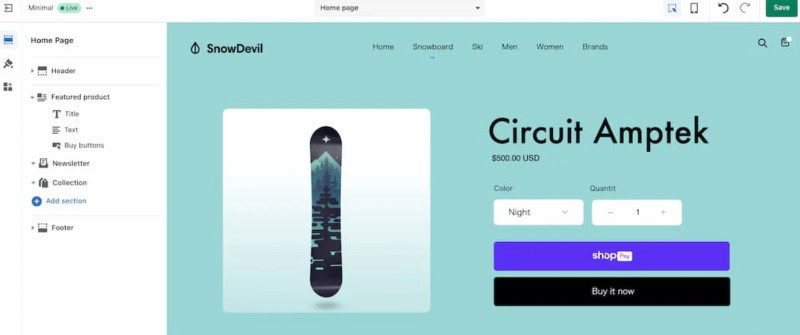
ClickFunnels vs Shopify Pricing
You can’t settle the ClickFunnels vs Shopify debate without considering prices.
The cheapest overall option when choosing Shopify or ClickFunnels would be Shopify’s Basic plan, which costs $29 per month. But is that really what you want?
You better look at all the Shopify vs ClickFunnels pricing details below. That way, you can decide whether Shopify or ClickFunnels provides the best value for your business.
ClickFunnels Pricing
ClickFunnels offers 2 different plans, and they’re both jam-packed with features:
- The Startup Plan costs $97 per month, or $81 per month if you choose annual billing. You’ll get unlimited funnels, web pages, and domains. The only limits are that you can only create 3 “brand workplaces,” and only 3 team members get access.
- The Pro Plan costs $297 per month, or $249 per month with annual billing. Not only will you get unlimited domains, funnels, and web pages, but the limit on team members and brand workplaces jumps up to 10.
Got a standard online business? Then, the Startup plan should be fine.
ClickFunnels also gives you both a 14-day free trial and a 30-day money-back guarantee.
Shopify Pricing
Shopify offers 4 different packages, each with its own price:
| Plan | Price (per month, billed annually) | Main Perks | Card processing rates |
| Basic “For solo entrepreneurs” | $29 | 24/7 chat supportShipping discount of up to 77% | Online: 2.9% + 30¢In-person: 2.6% + 10¢3rd-party provider: 2% |
| Shopify “For small teams” | $79 | 24/7 chat supportShipping discount of up to 88%5 additional staff accounts | Online: 2.7% + 30¢In-person: 2.5% + 10¢3rd-party provider: 1% |
| Advanced “As your business scales” | $299 | “Enhanced” 24/7 chat supportShipping discount of up to 88%15 additional staff accounts10x checkout capacity | Online: 2.5% + 30¢In-person: 2.4% + 10¢3rd-party provider: 0.6% |
| Plus “For advanced businesses” | $2,300 (*must commit to a 3-year term) | 200 inventory locationsUnlimited staff accounts40x checkout capacity | Not specified (claims to be “competitive” for high-volume sellers) |
When it comes to the card processing rates, keep in mind that Shopify manages your credit card sales for you – but, like any payment processor, they charge you a percentage of every sale.
Want to try out a plan? Shopify offers a 3-day free trial, and your first month (with any plan except the “Plus” plan) costs just $1.
This is great news for anyone who’s stuck in the Shopify or ClickFunnels dilemma. You can give Shopify a shot for an entire month, and it costs less than coffee at a gas station.
If money for your business is a stumbling block, check out my articles:
- Best small business loans
- Best banks for small business
- Best business credit cards
- Financial planning for small businesses
- How to get a startup business loan with no money
ClickFunnels vs Shopify Pros and Cons
With so many features (many of which overlap) the ClickFunnels vs Shopify debate can get complicated. What are we, quantum physicists?
Let’s simplify things by listing the pros and cons of each platform.
ClickFunnels Pros and Cons
ClickFunnels Pros:
- Your site will be optimized for “conversions.” Whether you want people to buy things, sign up for a newsletter, or join a membership, ClockFunnels will steer them in the right direction.
- There’s a 14-day free trial. There’s also a 30-day money-back guarantee, so you have over a month to check the software out before you commit.
- The company gets rave reviews. Users give ClickFunnels an average of 4.4 stars on Trustpilot.
ClickFunnels Cons:
- You lose your “funnels” if you cancel your membership. Dang companies not allowing us to keep using their stuff for free!
- The plans are pricey. The cheapest option from ClickFunnels costs $81 per month. That makes it the more expensive platform in the ClickFunnels vs Shopify discussion. But if you’re making a nice profit because of ClickFunnels features, it’s worth it.
- There’s no built-in shipping assistance. If you want help sending your products to customers, you’ll need to integrate with another solution like Shippo.
Shopify Pros and Cons
Shopify Pros:
- They’re experts in creating online stores. If your main focus is retail, Shopify can give you the virtual storefront you need.
- The Basic Plan is super affordable. You can get started on Shopify for just $29 per month.
- You’ll get lots of management assistance. From inventory to shipping, Shopify simplifies the logistical side of running an online store.
Shopify Cons:
- There’s less of a focus on sales and marketing. Unlike ClickFunnels, Shopify doesn’t design your website around the sales funnel concept.
- The company gets bad reviews. Shopify has 1.5 stars on Trustpilot, with a lot of users complaining about poor customer service.
- You need a more expensive plan to get enhanced customer support. This suggests that the standard customer support is lacking.
Whether you use ClickFunnels or Shopify, both are proven ways how to make money on Facebook and how to make money on Pinterest.
If your ultimate goal is to put your online business for sale to profit millions of dollars, remember the buyer will need to take over your process and technology. The less work they have to do, the better.
Either Shopify or ClickFunnels is a good foundation for a business that you intend to sell. Just be sure to download and keep all of your customer information.
ClickFunnels vs Shopify Reviews
Still can’t decide to use Shopify or ClickFunnels? Let’s take a look at what real users are saying. They’re the best judges in the ClickFunnels vs Shopify debate.
ClickFunnels is super popular with users, earning 4.4 stars on Trustpilot.
In a 5-star review, someone called ClickFunnels “the best software and entrepreneurial community ever.” They especially appreciated the “active” customer support and the fact that ClickFunnels “keeps adding features almost every other day.”
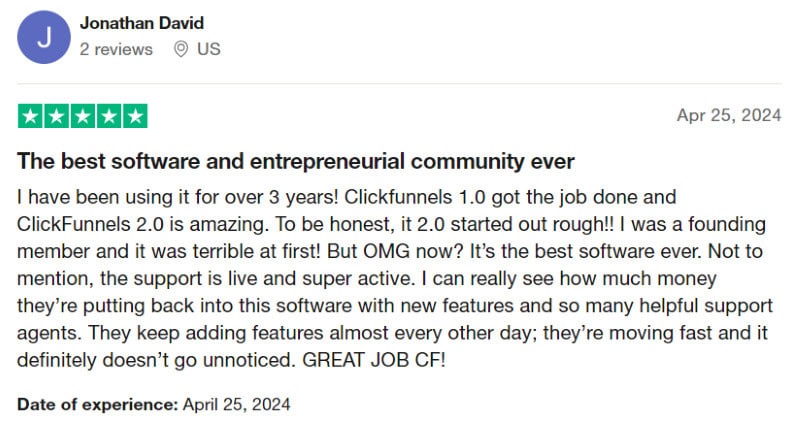
Another user left a 4-star ClickFunnels review. They didn’t find the interface intuitive, but their final verdict was still “so far so good.”
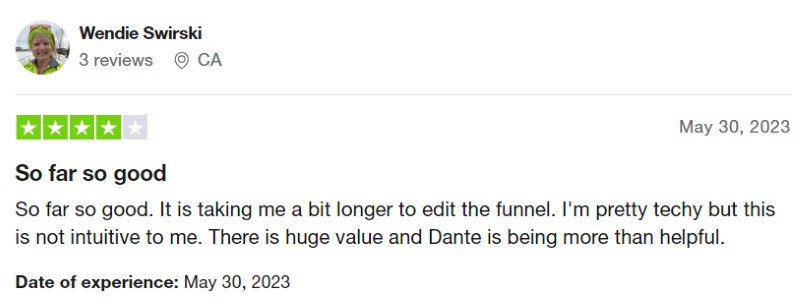
Someone else left a 3-star ClickFunnels review with a simple complaint: It’s too expensive. They claimed there are “better cheaper solutions available.”
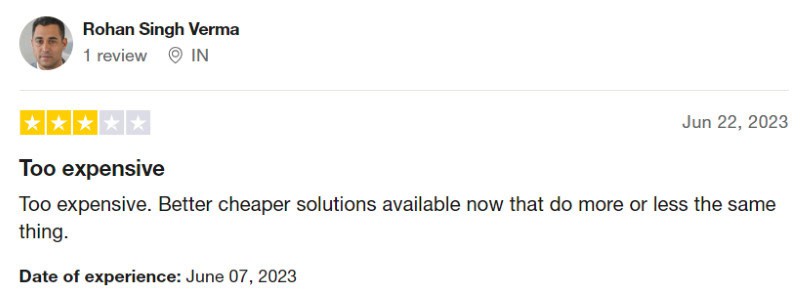
ClickFunnels is well-liked online, but what about the other side of the ClickFunnels vs Shopify debate?
Sadly, Shopify only gets 1.5 stars on Trustpilot. If ClickFunnels is the popular star of the varsity basketball team, Shopify is the loner smoking cigs in the bathroom (and their lighter just fell in the toilet).
Still, people love Shopify (which doesn’t surprise me, because they offer amazing features).
In a 5-star Shopify review, someone praised the “world-class platform and customer service.” When they experienced a payment issue, it was dealt with on a Sunday afternoon.
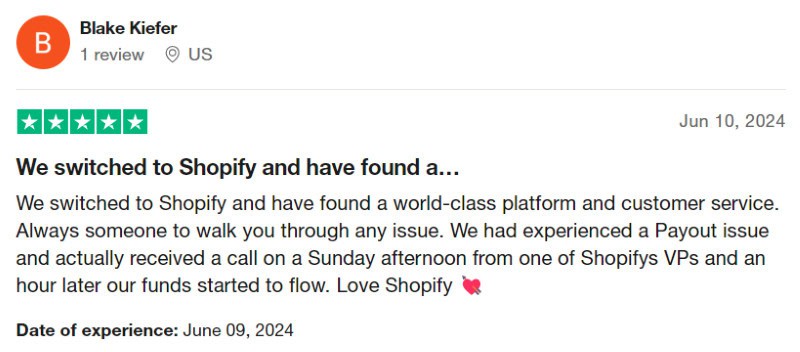
Another user called Shopify a “good website builder for testing products for sale,” but they still only gave the company 3 stars.
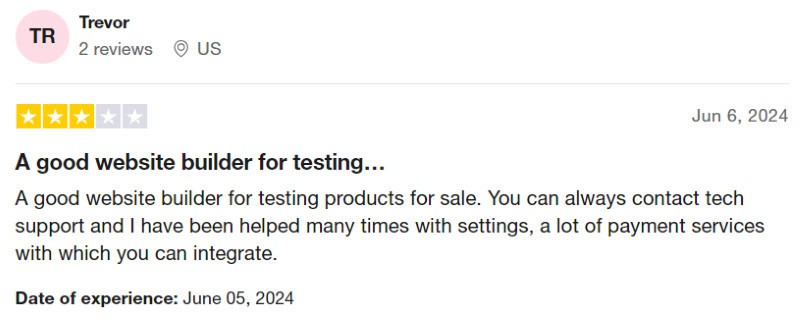
In an especially angry 1-star review, someone called Shopify “the worst” (with approximately a gazillion exclamation marks). Apparently, this person found it impossible to talk to customer support.
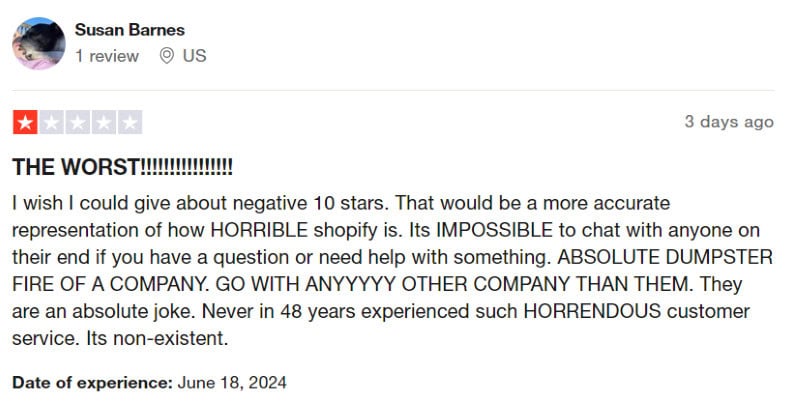
ClickFunnels vs Shopify: Which Is Better?
The ClickFunnels vs Shopify debate comes down to the priorities you have for your business.
Whether you use Shopify or ClickFunnels, first learn how to make money online for beginners. Then apply these principles to your Shopify store or ClickFunnels marketing system.
You can use either Shopify or ClickFunnels to build an online store, and both platforms will help with:
- Online sales and marketing (smart web page layouts, email campaigns, etc.)
- Business management (inventory, shipping, etc.)
But ClickFunnels really nails the online sales and marketing side, while Shopify crushes the business management end.
Is your goal to get people to buy a few key products or sign up for a membership or subscription? In that case, ClickFunnels is probably the winner of the ClickFunnels vs Shopify showdown. The “sales funnel” approach will streamline your website and boost your profits.
But what if you’re planning to sell a wide variety of products in a genuine online store? In that case, Shopify is the “Shopify vs ClickFunnels” champion. The platform is specifically designed to help online retailers advertise rows and rows of products.
So – ClickFunnels or Shopify? Start by looking at your business model and make the decision from there.
Commonly Asked Questions About ClickFunnels vs Shopify
Alternatives to ClickFunnels / Alternatives to Shopify?
Here are alternatives to using ClickFunnels or Shopify for your online business:
- Kit (read my ClickFunnels vs Kit comparison guide and my full Kit review)
- Sellfy (see: Sellfy vs Shopify)
- Builderall (here’s a detailed Builderall vs ClickFunnels guide)
- Pipeline Pro (check out my article on Pipeline Pro vs ClickFunnels)
- ThriveThemes (read my article Thrive Themes vs ClickFunnels)
- SamCart (see this SamCart vs ClickFunnels review)
- Kartra (learn more in this in-depth Kartra vs ClickFunnels article)
- WordPress (see my ClickFunnels vs WordPress comparison)
- Kajabi (learn more in my Kajabi vs ClickFunnels comparison)
- DropFunnels (check out my DropFunnels vs ClickFunnels post)
- A website (find out which is best for you: ClickFunnels vs Website)
- Squarespace
- Elementor
- Podia
- Thinkific
You can also build your website and sales funnel yourself using
- Best email marketing software
- Best website builder
- Best web hosting services
- Best small business website design
- Best blogging platform
- Best managed WordPress hosting
Either Shopify or ClickFunnels is a great way:
- How to make 50k a month
- How to make 30k a month
- How to make 20k a month
- How to make 10k a month
- How to make 20000 dollars a week
- Jobs that pay 1 million dollars a month
- Jobs that pay over 1 million a year
- How to start a pet care blog (if you’re selling pet care products or educational courses)
Building advertising funnels to a landing page or a Shopify store are both outstanding low-cost business ideas with high profit and make my list of most profitable online businesses.
You can start these online businesses with very little money, or if you have money, it’s a business to start with 10k. Then, learn how to turn 10k into 100k.
Can You Use ClickFunnels With Shopify?
Yes, you can build a sales funnel with ClickFunnels and use it with a Shopify website. You can use an app like ClickifyPro to connect ClickFunnels with Shopify. Or you can use Zapier. Also, ClickFunnels offers a Shopify integration, so the process should be totally seamless.
Does Shopify Have a Funnel Builder?
Shopify doesn’t have a special built-in funnel builder, but you can create sales funnels yourself with the tools that Shopify gives you. Another option is to use an external funnel builder like ClickFunnels and then integrate it with your Shopify site.
ClickFunnels Customer Support Email / ClickFunnels Support Number / ClickFunnels Billing Support?
If you have questions about billing or anything else, you can email ClickFunnels support at [email protected] or submit a ticket online through the ClickFunnels Classic Help Center. You can also call the ClickFunnels corporate office at 208-323-9451.
Related:
- Best small business accounting software
- Hobbies to make money
- Referral bonus apps
- Earn 20 dollars per referral
- How to make money as an attractive female
- How to make money as an attractive male
- Why do you need an LLC
- LLC Checklist
- LLC 101
- How to avoid using home address for LLC
- Best LLC service
- Bizee vs ZenBusiness
- Best VPN services
- Best small business firewall review
- Remote employee training
- Employee training software
Sources:
